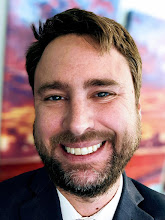 |
I love new things. New technology, new guitars (I may have a problem, I won't deny it!), new goodies to print on my 3d printer. There is something about "new" that feels like an expression of life to me. New can be quite exciting and fun!
In our society I believe that we are conditioned to assume that just because something is shiny and new, it must be better. The whole smartphone industry is a great example of this--we are told that we need that new iPhone every year, even though that new iPhone isn't really doing anything new or much better than last year's iPhone. It still takes pictures, it still makes phone calls, it still browses the Internet and has tons of apps that all do various different cool things. Functionally speaking, when I look at the core things a smartphone needs to do, the iPhone of today isn't really that different than the very first iPhone. They both do the same things; maybe the new iPhone does those things better, but that original iPhone would still get the job done.
This gets me thinking about the new things that are supposedly better for us and whether or not that is actually true. Social media is one of those things; Facebook and Instagram and TikTok are all sold to us as making our lives better. But the more time we spend with them, and the more studies are performed, the more we are seeing that this way of communicating with each other might actually be worse than how we used to do things. I don't know if it is a direct cause, but since we, as a society, really bought in to the Internet and its ways of facilitating communication between humans, it seems like we are more divided now than we were before.
My point for us to consider here is that even though new things can be attractive and inspiring, and even though they often do make life better, there are many instances where it's wise that we don't throw the baby out with the bathwater. While communicating on the Internet may be easier in the sense that we can collect all our thoughts and then launch them in an email or social media post at another person or persons, humans evolved over tens of thousands of years to communicate face to face. We became so good at it that organizations like the United Nations were formed after the atrocities of World War 2--without even the idea of the Internet, we were able to organize member countries into the closest expression of worldwide unity we have ever had in all of human history.
That all happened with face to face communication. This kind of communication, I feel, has been diminished by the shiny and the new of the Internet and social media. And so many of us get to rediscover what it means to communicate with another beautiful human being face to face.
We will be diving into this topic and how it impacts our spirituality tonight with my talk "Don't Throw the Baby Out With the Bathwater." Come to the Center at 7pm tonight for freshly baked bread, tea, cookies, and beautiful music from Christopher Fritzsche.
See you soon!
-Russ

Comments
Post a Comment